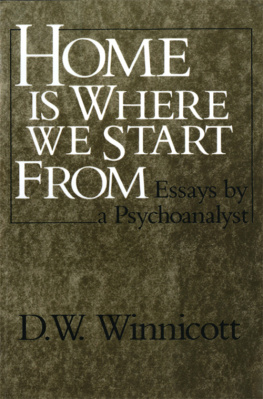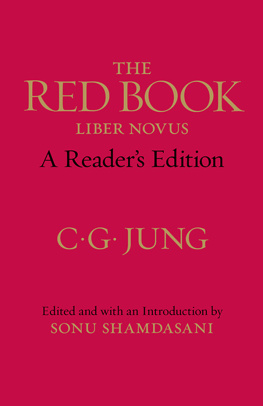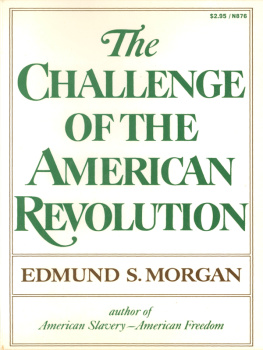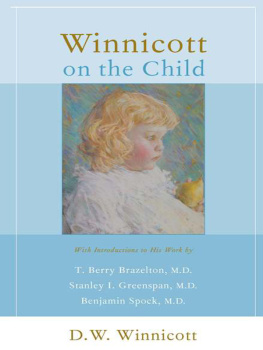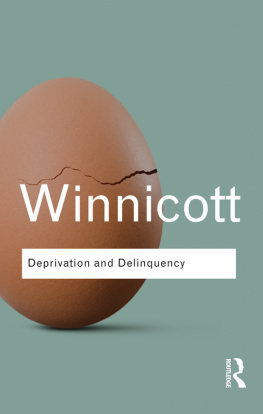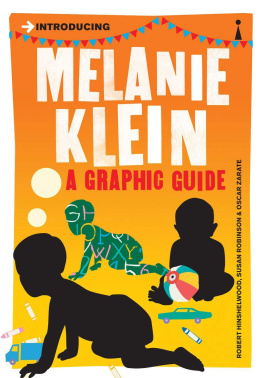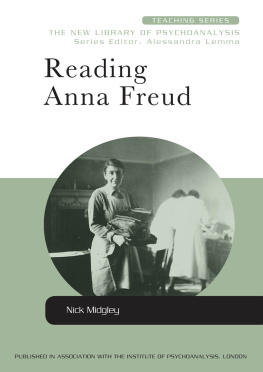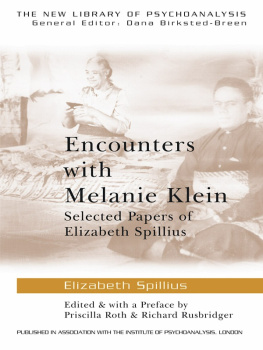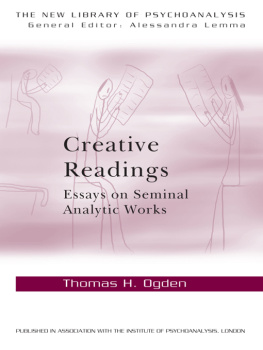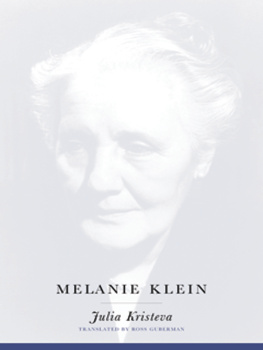
Copyright the Estate of D. W. Winnicott, 1986
First American edition, 1986
All rights reserved.
First published as a Norton paperback 1990
The Library of Congress has cataloged the printed edition as follows:
Winnicott, D. W. (Donald Woods), 1896-1971.
Home is where we start from.
1. PsychoanalysisAddresses, essays, lectures.
2. PsychoanalysisSocial aspectsAddresses, essays, lectures.
3. FamilyAddresses, essays, lectures.
4. Social psychologyAddresses, essays, lectures.
5. Psychology, PathologicalAddresses, essays, lectures.
I. Winnicott, Clare. II. Shepherd, Ray. III. Davis, Madeleine.
IV. Title.
BF173.W548 1984 15O.195 83-22100
ISBN: 978-0-393-30667-5
ISBN: 978-0-393-24970-5 (e-book)
W. W. Norton & Company. Inc., 500 Fifth Avenue, New York, NY 10110
W. W. Norton & Company Ltd, Castle House, 75/76 Wells Street, London W1T 3QT
The publishers are grateful for the opportunity to reproduce material already published in the following books and journals:
The Concept of a Healthy Individual in Towards Community Mental Health, edited by J. D. Sutherland (London: Tavistock Publications, 1971);Sum, I Am in Mathematics Teaching (March 1984); The Value of Depression in British Journal of Psychiatric Social Work (vol. 7, no. 3, 1964); Delinquency as a Sign of Hope in the Prison Service Journal (vol. 7, no. 27, April 1968); The Mothers Contribution to Society in The Child and the Family (London: Tavistock Publications, 1957) and also partly in the Introduction to The Child, the Family and the Outside World (London: Penguin Books, 1984); Children Learning in The Human Family and God (London: Christian Teamwork Institute of Education, 1968); Adolescent Immaturity in Proceedings of the British Student Health Association (1969), also in Playing and Reality (London: Tavistock Publications, 1971; New York: Basic Books, 1971; Harmondsworth: Penguin Books, 1985) and also partly in Pediatrics (USA) (vol. 44. no. 5, 1 November 1969); Thinking and the Unconscious in the Liberal Magazine (March 1945); The Price of Disregarding Psychoanalytic Research in The Price of Mental Health: Report of the National Association for Mental Health Annual Conference (London, 1965); Freedom (in French) in Nouvelle Revue de Psychanalyse (no. 30, 1984); Some Thoughts on the Meaning of the Word Democracy in Human Relations (vol. 3, no. 2, June 1950) and also in The Family and Individual Development (London: Tavistock Publications, 1965, 1968).
The following papers are published for the first time in this volume:
Psychoanalysis and Science: Friends or Relations? (1961); Living Creatively (1970); The Concept of the False Self (1964); Aggression, Guilt and Reparation (1960); Varieties of Psychotherapy (1961); Cure (1970); The Child in the Family Group (1966); This Feminism (1964); The Pill and the Moon (1969); Discussion of War Aims (1940); Berlin Walls (1969); The Place of the Monarchy (1970).
The Editors acknowledge with gratitude help from The Squiggle Foundation in producing the transcript of The Pill and the Moon, and from Dr Colin Morley with the mechanics of the index.
D.W. Winnicott
Home is Where
We Start From
Essays by a Psychoanalyst
Compiled and Edited by
Clare Winnicott,
Ray Shepherd,
Madeleine Davis

W. W. NORTON & COMPANY
NEW YORK LONDON
A talk given to the Royal Medico-Psychological Association, Psychotherapy and Social Psychiatry Section, 8 March 1967
Preliminaries
We use the words normal and healthy when we talk about people, and we probably know what we mean. From time to time we may profit from trying to state what we mean, at risk of saying what is obvious and at risk of finding we do not know the answer. In any case our standpoint moves on with the decades, so that a statement that suited us in the forties might seem to serve us badly in the sixties.
I shall not start off with quotations from those authors who have dealt with this same subject. Let me say at once that I have derived most of my concepts from those of Freud.
I hope that I shall not fall into the error of thinking that an individual can be assessed apart from his or her place in society. Individual maturity implies a movement towards independence, but there is no such thing as independence. It would be unhealthy for an individual to be so withdrawn as to feel independent and invulnerable. If such a person is alive, then there is dependence indeed! Dependence on mental nurse or family.
Nevertheless, I shall study the concept of the health of the individual, because social health is dependent on individual health, society being but a massive reduplication of persons. Society cannot get further than the common denominator of individual health, and indeed cannot get so far, since society needs must carry its unhealthy members.
Maturity at Age
In terms of development it can be said that health means maturity according to the maturity that belongs to the age of the individual. Premature ego development or premature self-awareness is no more healthy than is delayed awareness. The tendency towards maturation is part of that which is inherited. In a complex way (which has received much study) development, especially at the beginning, depends on a good-enough environmental provision. A good-enough environment can be said to be that which facilitates the various individual inherited tendencies so that development takes place according to these inherited tendencies. Inheritance and the environment are each external factors if we speak in terms of the emotional development of the individual person, that is to say, of psychomorphology. (I have wondered whether this term could be used instead of the clumsy use of the word psychology, prefixed by the word dynamic.) It can usefully be postulated that the good-enough environment starts with a high degree of adaptation to individual infant needs. Usually the mother is able to provide this because of the special state she is in, which I have called primary maternal preoccupation. Other names have been given to this state, but I am using my own descriptive term. Adaptation decreases according to the babys growing need to experience reactions to frustration. In health the mother is able to delay her function of failing to adapt, till the baby has become able to react with anger rather than be traumatized by her failures. Trauma means the breaking of the continuity of the line of the individuals existence. It is only on a continuity of existing that the sense of self, of feeling real, and of being, can eventually be established as a feature of the individual personality.
Infant-Mother Interrelationships
It is at the beginning, when the baby is living in a subjective world, that health cannot be described in terms of the individual alone. Later it becomes possible for us to think of a healthy child in an unhealthy environment, but these words make no sense at the beginning, till the baby has become able to make an objective assessment of actuality, and has become able to be clear about the not-me as distinct from the me, and between the shared actual and the phenomena of personal psychical reality, and has something of an internal environment.
I am referring to the two-way process in which the infant lives in a subjective world and the mother adapts in order to give each infant a basic ration of the experience of omnipotence. A living relationship is involved, essentially.
Next page
